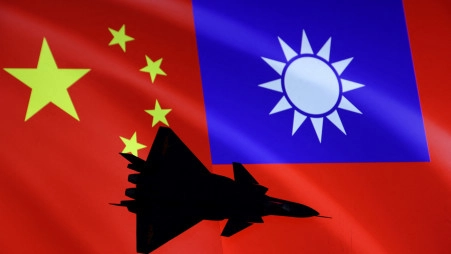The December sun is baking on the Heng Chun peninsula, the tongue of land that juts out from the bottom end of Taiwan into the Philippine Sea.
A half-smoked cigarette pokes from the corner of Hsu Keng-Jui’s mouth. He is part of a network of volunteers – most of them veterans like him – who track the now-constant presence of Chinese ships and aircraft just outside Taiwan’s territorial limit.
Using plastic zip ties, Mr Hsu straps a long radio antenna to a steel railing, then sits down with his portable radios and begins to scan the military channels. At first all we hear is the soft southern lilt of the Taiwan coastguard directing sea traffic. Then a different accent and a different tone comes through the heavy static. It’s the Chinese navy.
China has been ramping up the pressure ahead of a pivotal presidential race in Taiwan, an island it has long seen as a renegade province. With just weeks to go, Beijing looms larger than ever before – on the ballot, and at Taiwan’s borders.
ADVERTISEMENT
“We represent all the people of China,” the voice from the Chinese navy intones. “The People’s Republic of China is the only legitimate government of China, and Taiwan is an inseparable part of China.”
Dragging on another cigarette, Mr Hsu looks unmoved: “I hear it every day now. It’s like they’re reading from a script.”
Another voice comes across the airwaves. It’s the captain of a Chinese tugboat, just three miles off Taiwan’s coast.
The captain has been asked to move out of Taiwan’s territorial waters, but he refuses: “What territorial waters are you talking about? Taiwan doesn’t have any territorial waters!”
Mr Hsu is suddenly furious. He leaps up, grabs a handset and lets loose a stream of invective over the airwaves. He swears as he sits back down, muttering, “Who does he think he is?”
For decades the governments in Beijing and Taipei had an unwritten agreement not to stray across a median line that divides the 110-mile-wide strait between them. Now China is crossing it almost daily, at sea and in the air. On one day in September the People’s Liberation Army sent more than a 100 aircraft towards Taiwan, 40 of which crossed the median line.
This so-called “grey zone warfare” is meant to “subdue the enemy without fighting” to borrow the words of a legendary Chinese military strategist. In this case the enemy is Taiwan’s government, those who support Taiwan’s permanent separation from China, and its foreign allies in the United States and Japan.
“China is sending a very strong message to the United States and even Japan,” says retired Admiral Lee Hsi-min, a former commander of Taiwan’s armed forces. “It’s telling them that Taiwan is part of China. That this is our area so we can do whatever we want here. Meanwhile it’s aimed at making Taiwanese people scared and making them capitulate.”
Beijing on the ballot – again
President Tsai, who has been candid yet deft in her defence of Taiwan’s sovereignty, is deeply disliked by Beijing. But the man running to replace her, current vice-president William Lai, is far worse in their eyes. Despite saying he will do nothing to change the status quo, Mr Lai is seen by China as a hardline “splittist”, an advocate of formal Taiwan independence.
Beijing’s message to voters in Taiwan is that a vote for William Lai is a vote for war. It’s also the message from the main opposition party, the nationalist Kuomintang or KMT. Their candidate Hou Yu-ih told supporters at a recent rally: “Our whole generation will lose everything we have fought for during our lifetime [if Lai wins].”
But DPP supporters don’t seem cowed. They have seen this movie before, and every four years since Taiwan’s first presidential election in 1996.
On a recent drizzly Sunday afternoon, around 60,000 DPP supporters crowded into a square in downtown Taipei to see Mr Lai and his running mate speak.
Then President Tsai stepped onto stage and the crowd came alive cheering and waving little, green DPP flags. Dotted among them were many rainbow flags of gay pride. Ms Tsai is adored by the LGBT community here for making Taiwan the first place in Asia to legalise same-sex marriage.
Democratic elections aside, this is yet another thing that sets Taiwan apart from China. And it is one of many reasons DPP supporters are adamant this island will never be part of the People’s Republic of China.
“I am very worried [about the threats from China], but I am not afraid,” said Frederika Chou. “Because I will volunteer to be a soldier and fight if they ever try to invade our beautiful country.”
“Some day we may have war, but I’m not afraid because I am Taiwanese, and I need to protect my country,” said 27-year-old Abby Ding who’d come to the rally with her father all the way from Tainan in the south.
Beijing is far from the only issue on the ballot. Rising costs, unaffordable housing and shrinking opportunities have driven dissatisfaction against the DPP – and sent young voters into the arms of the Taiwan People’s Party and its populist candidate Ko Wen-je.
Once a DPP supporter, Mr Ko now positions himself as a middle-of-the road option between his main rivals – and one who can broker better ties with Beijing. While “reunification” was always a possibility, China’s claims have now turned more urgent, especially with its leader Xi Jinping’s repeated vows to take the island, with a deadline to boot.
The issue of how much Taiwan should prepare to fight divides the island’s main parties. The current DPP government has invested heavily in new, domestically-built submarines and bought scores more F16 fighter jets and modern missiles from the US. It has reinstated 12-month-long compulsory military service and says it will do more if re-elected.

